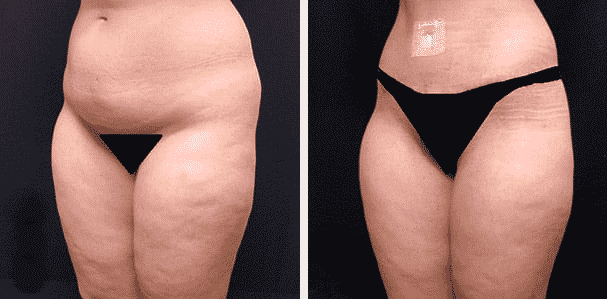If you want to smooth and tighten your thighs by eliminating excess skin, a thigh lift may be the solution you've been seeking. Whether you've recently experienced significant weight loss or simply want to restore a youthful silhouette, this transformative procedure can help you feel more confident in your skin. Dr. Rachel Walker at Dallas Plastic Surgery Center specializes in thigh lifts, offering personalized care and beautiful results tailored to each patient's unique goals.

What is a Thigh Lift?
A thigh lift after major weight loss can improve the upper thighs, especially the outer thighs.
The outer thigh lift I use involves the design of a large ellipse at the hip level to allow the scar to be hidden under a bathing suit. The result can be “previewed” fairly realistically by grabbing a large handful of skin just below the panty line and pulling up. You’ll see that the greatest effect is closest to your hand, and as you look down the thigh, the lift is less and less prominent.
Thigh lifts are far from perfect since the tension that would be necessary to get tightening below the mid thigh can be so great that the scar would be likely to split open or at least heal very poorly. Scars under great tension tend to widen quite a bit. Some patients may be a better candidate for Thigh Liposuction, Dr. Walker will determine this during your consultation.
Before and After Thigh Lift Surgery

Inner Thigh Lift Surgery
Inner thigh lifts are not performed by the majority of plastic surgeons because they rarely tend to be outstanding and often are a disappointment. As with the outer thigh lift (but more so), the greatest effect is closest to the incision and the degree of lift decreases as you get farther down the thigh. Complicating the inner thigh lift is the fact that the leg has to be rolled out to allow the surgeon to get to the area, remove the skin excess and be able to sew it together. After the last stitch, the leg is brought back in, relaxing the lift and limiting how tight it can be, leading to disappointment. I do perform inner thigh lifts but only in the ideal candidate with most of the problem in the upper 1/3 of the inner thigh. The scar can be quite visible bordering the vulva and curves along the inner thigh high up into the gluteal crease. There is a variation which removes skin vertically with the scar extending from the upper inner thigh down to the knee. This results in better skin tightening but because of the extent of the scar I have not used this technique and find very few patients who are willing to consider it. They are often presented at meetings as extreme cases and are probably most appropriate for the extreme post bariatric surgery patient with massive weight loss.
Patient Testimonial
"Dr. Walker is an amazing surgeon. She is very detail oriented, her bedside manner is excellent, and you can tell she truly cares about her patients. She is very thorough in her explanations and makes sure you understand."
Preparing for a Thigh Lift
Although efforts are made to reduce downtime, a thigh lift is an invasive surgical procedure that requires several weeks to heal. Prior to treatment, patients should make appropriate arrangements to ensure that they have adequate time to rest and let their incisions heal.
You will not be able to exercise for three to four weeks; you will likely need to take two to four weeks off work, depending on how much physical activity is required at your place of employment. Those with more physically demanding work will have to make modifications to protect their incisions and ensure a healthy recovery.
As a thigh lift involves general anesthesia, your plastic surgeon may request you receive medical clearance from a primary care physician. Part of this medical screening may include bloodwork, a prescription medication evaluation, and lifestyle changes, such as not drinking or smoking for at least two weeks before surgery.
Who Is a Good Candidate for a Thigh Lift?
Ideal thigh lift candidates:
- Are in good general health
- Are 10 pounds within their ideal weight
- Do not have health conditions that affect their immune system or ability to heal
- Do not smoke
- Have excess soft tissue around the middle and outer thigh regions
- Have realistic expectations about their likely results
- Are committed to maintaining a healthy weight and lifestyle with a balanced diet and exercise plan
Dr. Walker will discuss your thigh lift candidacy during a consultation appointment. During this visit, she will ask about your surgical goals, take your medical history, and discuss likely outcomes of thigh lift surgery, as well as any potential complications.
Thigh Lift Recovery
During a pre-operative appointment, you will be given care instructions that detail how to treat your surgical wounds and manage discomfort after treatment. Your plastic surgeon will address any antibiotics you have to take or pain-relieving medications you can use to manage swelling and sensitivity at the incision sites.
You should ask questions during this meeting to gain a realistic understanding of what a thigh lift recovery looks like. Be sure to bring these points up with your surgeon:
- What medication can I take after surgery?
- Is there anything I need to avoid after surgery?
- When can I resume exercise?
- What movements should I restrict or avoid?
- What happens after surgery is complete?
- What happens if there are any complications during the procedure?
- What signs of complications should I watch for after surgery?
How Much Does a Thigh Lift Cost?
The cost of a thigh lift varies according to a patient’s needs, the technique used, and the extent of treatment. Dr. Walker will personally assess your body to determine whether a thigh lift is the most appropriate procedure to achieve your aesthetic goals.
After your consultation, we will provide you with a price that includes the cost of treatment as well as additional surgical fees, such as anesthesia and post-operative care.
How Long Does a Thigh Lift Last?
Results from a thigh lift are evident immediately but continue to improve several months after the procedure. Generally, patients can expect the results to last between five to 10 years with proper aftercare. To avoid unwanted cellulite or excess fat returning, it is important to maintain a healthy lifestyle with enough cardiovascular exercise each week.
Dr. Walker can advise you on the best exercises to perform to help maintain your thigh lift results.
Why Choose Dr. Rachel Walker for a Thigh Lift
When considering a thigh lift, you want a surgeon who understands your unique goals and offers a personalized approach to achieving them. Dr. Rachel Walker at Dallas Plastic Surgery Center is a board-certified plastic surgeon known for her artistic eye, meticulous attention to detail, and dedication to providing natural-looking results. With extensive training, Dr. Walker brings a high level of expertise to every procedure. At Dallas Plastic Surgery Center, you'll find a warm, supportive environment where your comfort and satisfaction are top priorities.
What truly sets Dr. Walker apart is her commitment to patient-centered care. You will have a thorough consultation where Dr. Walker and her world-class staff listen to your aesthetic goals and concerns. They explain the thigh lift procedure, recovery time, risks, and options, ensuring your expectations are realistic and achievable. The staff's experience with cosmetic procedures enhances their empathy and understanding, making your journey smoother and more comfortable. Whether reviewing before-and-after photos or receiving a customized information pack to guide you through preparation and recovery, you can trust that Dr. Walker and her team will be with you every step.
Frequently Asked Questions
A thigh lift can be performed along with liposuction, tummy tuck, or lower body lift. Combining procedures achieves more comprehensive results and reduces overall recovery time.
Yes, a thigh lift does leave scars, typically located along the inner thigh or groin crease, depending on the technique used. While the scars are permanent, they fade over time and are usually placed in less noticeable areas. Proper scar care and following your surgeon's instructions can help minimize their appearance.
Yes, significant weight gain after a thigh lift can negatively affect the results, causing the skin to stretch and sag again. Maintaining a stable, healthy weight is crucial to preserving the procedure's outcomes.
To maintain thigh lift results, focus on a healthy diet, consistent physical activity, and weight management. Avoiding significant weight fluctuations, staying hydrated, and following a skincare regimen to keep your skin firm and elastic can also help prolong the results.
A thigh lift primarily addresses excess skin and tissue, not cellulite. While the procedure may improve cellulite by tightening the skin, it does not directly eliminate it. Consider combining the thigh lift with cellulite-specific procedures like laser therapy or radiofrequency treatments for more targeted cellulite treatment.
Yes, once cleared by your surgeon, low-impact exercises such as walking, cycling, and gentle stretching can help maintain toned thighs. Gradually incorporating strength training, like leg presses or squats, can enhance muscle definition. Always follow post-surgery guidelines to prevent strain on the healing area.
Schedule a Thigh Lift Consultation
To learn more about Thigh Lifts and other Body Contouring Surgery options with Dr. Walker, please call us at 972-661-5077. Our practice serves Dallas, TX.
Click to learn about Pain Management Options.
Click here to learn more about our innovative simulator tool, Vectra 3D, to further assist you and the doctor during your consultation.
